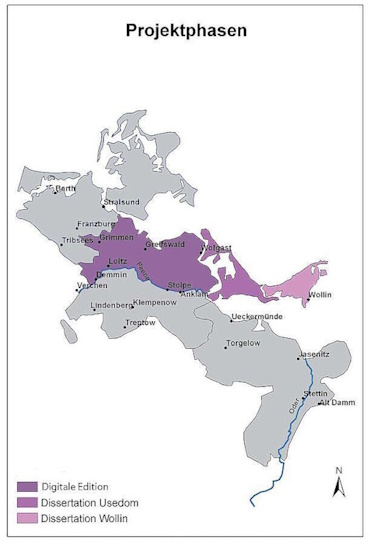NFDI4Memory is a consortium for disciplines working in the field of history. Alongside NFDI4Culture, NFDI4Objects and Text+, it is one of the four humanities consortia within the National Research Data Infrastructure (NFDI) network. Research institutions and memory institutions (archives, libraries, collections, museums) work closely together in NFDI4Memory. One focus is on methods of digital source criticism and the contextualisation of data. 4Memory aims to integrate historical data that is available in very different data formats and results from numerous specific application contexts and requirements. This includes texts from antiquity to modern times, images, photos, audio and video recordings, statistics, structured data, metadata, ontologies and hypertexts. 4Memory also focuses on personal data, spatial structures and the change in classification systems and categories over time.
- Ensuring the quality of historical data by establishing clear guidelines for the handling of data and metadata
- Improving the interoperability and reusability of historical data and data collections by harmonising and implementing clearly defined standards
- Expanding the connection of existing data collections by extending cross-platform search options and by increasingly making different historical data available for research purposes
- Improving the digital competence of historically oriented humanities scholars with regard to the management of research data and promoting cultural change in historically oriented disciplines through active dialogue with the relevant communities.
The Department of Media History at the Institute for Media Research is involved as a member/participant in Task Area 2 through Prof Dr Stefan Kroll. This works with two working groups in Munich and Halle (Saale) on the linking and contextualisation of historical research data in order to enable modern data management and form the foundation for the planned 4Memory Data Space. The aim is to lay the foundations for historically sensitive and unambiguous standard and metadata, develop research-based historical categorisations and link them with those of archives, libraries and museums for joint use in the Semantic Web.
Since 1 January 2008, the former Multimedia and Data Processing in the Humanities department at the University of Rostock has been working on the DFG-funded project ‘Maps and Texts of the Swedish Land Survey of Pomerania 1692-1709. A GIS-supported selection edition of the first German cadastre on the Internet’ under the direction of Prof. Dr Stefan Kroll and in cooperation with geographers, computer scientists and nordists from Greifswald. The edited source material consists of the maps and texts produced in the Swedish survey of the Swedish part of Pomerania north of the River Peene during the years 1692-1709. The surveying and description of each individual village and the associated village boundaries as well as the land and houses of the larger towns was undertaken in order to obtain an exact assessment basis for taxation.
Considered to be one of the earliest German cadastral surveys, it represents a unique component of Germany's cultural heritage and is also of great importance in international comparison, especially as it is almost completely preserved. The project, which was funded over four years, has prepared a relevant part (around a quarter) of the total of 1,500 maps and approx. 23,500 pages of descriptive texts from the Swedish land survey of Pomerania north of the Peene in a digital, scientific edition consisting of various components and made it permanently available to researchers via the Internet. These include high-resolution digital copies, transcriptions and translations from the older New Swedish into German as well as a Geographical Information System - GIS. The digital edition has since been utilised by various research projects. Since 2021, these have included the international linguistic research project ‘Swedifying the other’, which is based at Uppsala University (Sweden) and in which Prof Dr Stefan Kroll is involved as co-investigator.
In recent years, Rostock has developed into one of Germany's leading and internationally recognised centres of demographic research. The ‘Max Planck Institute for Demographic Research’, demographic research specialisations at the University of Rostock and cooperation projects between the two institutions have made a decisive contribution to this. One example of this is the ‘Rostock Research Network for Historical Demography’, in which Prof Dr Stefan Kroll is involved from the Institute for Media Research. The network analyses demographic change from a broad historical-demographic perspective. The first step was to comprehensively analyse the demographic structures and processes of change in Mecklenburg society in the 19th century - thus contributing to research into the social structure of Mecklenburg-Vorpommern from a historical perspective.
Mecklenburg-Vorpommern is one of the most ageing regions in Germany - it is therefore often described as a laboratory in which the problems associated with an ageing population will occur earlier and more strongly than in other federal states. In the long term, additional data sets from other federal states and further subject areas of historical demography are to be analysed, possibly in follow-up projects. In this context, a historical-demographic project funded by the Gerda Henkel Foundation focussed on the ‘soul register’ of the West Pomeranian trading and university town of Greifswald from 1717.

